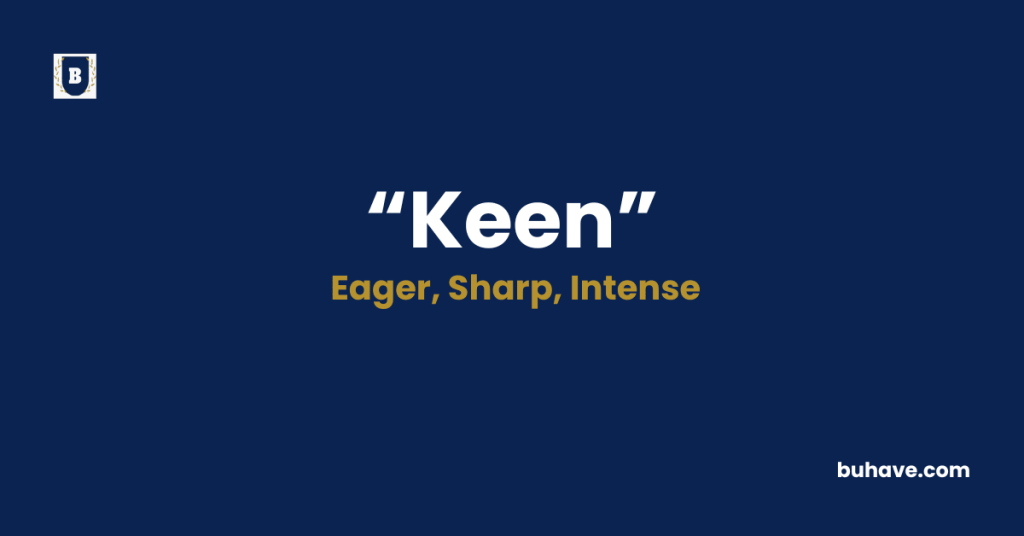The word ‘Keen’ (Adjective) describes a strong feeling of interest, enthusiasm, or sharp ability in someone. First of all, a person with a keen mind understands ideas quickly and notices small details that others might miss. in this guide, you’ll learn the full definition, synonyms, antonyms, etymology, and real-life examples of how to use ‘Keen’ correctly in sentences.
Keen Explained in Depth
A complete and detailed guide to the words Keen including meaning, definition, examples, etymology, synonyms, and antonyms.
Meanings of Keen
The word keen describes someone who shows strong interest, sharp awareness, or intense enthusiasm toward something. First of all, a it person pays close attention to details and reacts quickly to new information. Moreover, it can also describe a strong desire, such as being in to learn a new skill or explore a new place. In addition, people use keen to talk about sharp senses, like a it sense of smell or keen eyesight.
Furthermore, it can express emotional intensity, such as feeling keen sadness or joy. As a result, the word keen often highlights energy, sharpness, and strong feelings.
Therefore, understanding “keen” helps describe someone who approaches life with focus, passion, and alertness.
Definition:
Keen describes a strong feeling of interest, enthusiasm, or sharp ability in someone. First of all, a person with a keen mind understands ideas quickly and notices small details that others might miss. Moreover, keen can describe intense emotions, such as keen excitement or keen sadness, showing that the feeling is very strong. In addition, on often refers to sharp physical senses, like keen eyesight or keen hearing, which allow someone to notice things very clearly.
Furthermore, when someone feels keen about an activity, it means they are eager and fully committed to it. As a result, the word keen captures the ideas of sharpness, deep feeling, and strong focus. Therefore, using “keen” shows that someone has a high level of energy, passion, or ability.
Etymology:
The word keen comes from the Old English word “cēne,” which originally meant bold, brave, or fearless. First of all, people in early English-speaking communities used “cēne” to describe someone with courage and sharpness of spirit. Moreover, over time, the meaning of keen expanded to include sharpness of senses, emotions, and intelligence. In addition, during the Middle English period, it began to describe things that were literally sharp, like a it blade, and later, feelings that were sharp and intense.
Furthermore, the idea of it enthusiasm or eagerness developed naturally as people connected sharpness with quickness and strong feeling. As a result, the word keen today captures both physical sharpness and emotional intensity. Therefore, understanding the roots of it helps explain why it expresses energy, focus, and deep emotion.
Example Sentence:
- First of all, she showed a keen interest in learning new languages during her travels.
- Moreover, his keen sense of observation helped the team solve the mystery quickly.
- In addition, the students displayed keen enthusiasm during the science fair.
Keen Synonyms:
- Eager
- Sharp
- Enthusiastic
- Alert
- Sensitive
- Perceptive
- Passionate
- Intense
- Vigilant
- Attentive
Keen Antonyms:
- Apathetic
- Dull
- Uninterested
- Insensitive
- Slow
- Lazy
- Indifferent
- Careless
- Unaware
- Unenthusiastic
FAQs about Keen
Here’s a FAQ-style guide about the word “Keen”
1. What does “keen” mean?
“Keen” is an adjective with several related meanings, including:
- Eager or enthusiastic: “She’s keen to start her new job.”
- Highly developed or sharp: “He has a keen sense of smell.”
- Intellectually sharp or perceptive: “A keen mind.”
- In older or more formal use, it can also mean intense (e.g., “keen sorrow”).
2. What are common contexts for using “keen”?
Interest/Enthusiasm: “He’s keen on football.”
- Senses: “Dogs have keen hearing.”
- Intellect: “She offered a keen analysis.”
- Desire: “I’m keen to learn more.”
3. Is “keen” used differently in British and American English?
Yes. In British English, “keen” is commonly used to express interest or enthusiasm (e.g., “I’m keen on reading”). In American English, that usage is less frequent, and phrases like “interested in” or “excited about” are more common.
4. Can “keen” be used as a verb or noun?
Yes, but less commonly:
- As a verb, “to keen” means to wail in grief, especially in some traditional cultures.
- As a noun, “a keen” refers to a lamentation or wailing for the dead, especially in Irish tradition.
5. What are some synonyms for “keen”?
Depending on the context:
- Eager, enthusiastic: excited, passionate, avid
- Sharp, perceptive: acute, insightful, intelligent
- Strong (emotion): intense, deep, heartfelt
6. How do you use “keen” in a sentence?
- “She’s keen on joining the science club.”
- “The hawk’s keen eyesight helps it hunt.”
- “He gave a keen observation about the issue.”
7. Is “keen” formal or informal?
It is neutral—it can be used in both formal and informal contexts, though its tone can shift slightly depending on how it’s used.
Explore more K words:

















